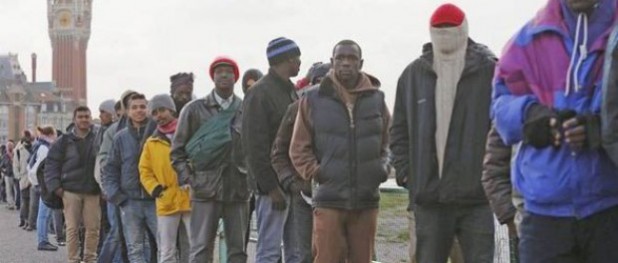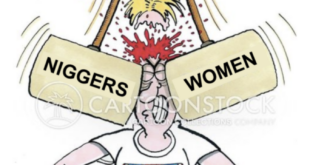Richard Mott
UKIP Daily
August 20, 2015
One only has to view the scenes at Calais or witness those rescued from the Mediterranean to see that they are overwhelmingly young, overwhelmingly male, overwhelmingly from Muslim countries and increasingly here in Europe. This rapid and significant infusion of single men is destabilising and, given their culture’s attitude to women, just plain dangerous.
The problem of gender selection, the consequent population imbalance and the continued second-class status of women were the subjects of a United Nation Population Fund investigation, part of which I have reproduced here:
“Today, more than 117 million women across Asia are “missing”, and many others are missing in Eastern European and Caucasus countries as well – largely the result of gender-biased sex selection, a form of discrimination. Since the 1990s, some areas have seen up to 25 per cent more male births than female births. The rise in sex selection is alarming as it reflects the persistent low status of women and girls. The resulting gender imbalance also has a damaging effect on societies. Instances of increased sexual violence and trafficking have already been linked to the phenomenon”.
Below, with my emboldening and my doubly emphatic underlining, I have reproduced two sections of an article published by the US National Academy of Sciences:
“In the absence of manipulation, both the sex ratio at birth and the population sex ratio are remarkably constant in human populations. Small alterations do occur naturally; for example, a small excess of male births has been reported to occur during and after war. The tradition of son preference, however, has distorted these natural sex ratios in large parts of Asia and North Africa. This son preference is manifest in sex-selective abortion and in discrimination in care practices for girls, both of which lead to higher female mortality. Differential gender mortality has been a documented problem for decades and led to reports in the early 1990s of 100 million “missing women” across the developing world. Since that time, improved health care and conditions for women have resulted in reductions in female mortality, but these advances have now been offset by a huge increase in the use of sex-selective abortion, which became available in the mid-1980s. Largely as a result of this practice, there are now an estimated 80 million missing females in India and China alone. The large cohorts of “surplus” males now reaching adulthood are predominantly of low socio-economic class and concerns have been expressed that their lack of marriageability, and consequent marginalization in society, may lead to antisocial behavior and violence, threatening societal stability and security. Measures to reduce sex selection must include strict enforcement of existing legislation, the ensuring of equal rights for women, and public awareness campaigns about the dangers of gender imbalance”.
As we have seen in Oxford, Rochdale, Rotherham and Telford, this male-centred, female denigrating mind set already flourishes in these isles and our authorities are all too often paralysed into inaction – maybe that has now become one of the attractions of our country. To allow in more is madness and this is before we consider the possibility of terrorists being among their number. Further on, the same report continues:
“In many countries, however, the sex ratio deviates from these norms because of the tradition of son preference. Son preference is most prevalent in an arc of countries from East Asia through South Asia to the Middle East and North Africa. Sons are preferred because (i) they have a higher wage-earning capacity, especially in agrarian economies; (ii) they continue the family line; and (iii) they are generally recipients of inheritance. Girls are often considered an economic burden because of the dowry system; after marriage they typically become members of the husband’s family, ceasing to have responsibility for their parents in illness and old age”.
Islam teaches that it alone is the one true religion and says those who do not follow the path of Allah are infidels, kaffirs, non-believers and thus contemptible. Many Islamic countries have draconian laws forbidding the worship of any other religion and Christianity is particularly demonised. Where Christians do exist they are begrudgingly tolerated at best, persecuted or, at worst, killed. So it is with more than a sense of astonishment that I see these displaced Muslims seek sanctuary, safety and solace in Christian Europe, the home of their arch enemy. They appear capable of arriving with a bewildering sense of entitlement and an airy disregard for the host upon whose territory they alight uninvited. Imagine what would happen to a migrating horde of Christians should one ever turn up on the shores of a Muslim country.
We must continue to resist taking in these people, whose company we did not seek and whose culture, beliefs and behaviour we do not want. They will upset even further the already strained situation in this continent. This should be a Muslim problem sorted out by Muslim countries. Speaking of which, why aren’t any of those oil and cash rich countries part of the solution in helping out their faith’s brethren? Perhaps too busy fighting among themselves or competing to waste money building even bigger phallic symbols in the desert?
The defeat of Muslim forces at the gates of Vienna in 1683, marked the zenith of the Ottoman Empire. Its modern successor, with its 78,000,000 inhabitants but only 3% of its land in Europe, is seeking entry to the EU. Today, an invader does not always wear a uniform, appear in massed ranks or openly carry weapons when seeking to achieve its aims. Unless we stop our spineless politicians sleepwalking us into disaster, Europe may again need to fight for its survival against an eastern enemy, the vanguard of which could be among us now.
 Daily Stormer The Most Censored Publication in History
Daily Stormer The Most Censored Publication in History



